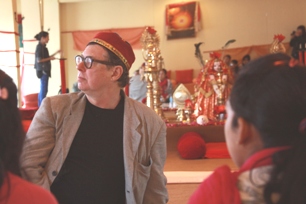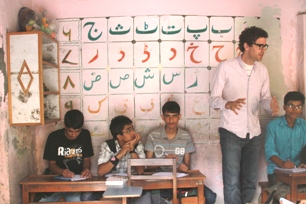 MARCUS BENIGNO 'King of slam' Bob Holman listens to an aspiring poet at Jatra Café in Thamel. |
The International Iowa Writers Program, organised by the US Embassy and Quixote's Cove, hosted workshops by contemporary big wigs of the American literary scene like Holman. Part cultural exchange, part mission empowerment--the Iowa Writers did more than share tips on their craft, they discussed current movements reshaping self-expression in the US namely, 'spoken word' and 'transmedia.' The workshops also revealed a need to preserve minority languages and the dearth of opportunity in the literary arts in Nepal.
'Spoken word' or 'slam poetry' began in Chicago in the mid-1980s. Typically, poets perform their pieces before an audience in an Olympic-style competition complete with judges and eliminations. Mirroring the Dadaists' return to oral traditions in its most primitive form, 'spoken word' stresses the poet's sound and body as part of the poem.
Nepali writer Yuyutsu Sharma, who dubs Holman 'the king of slam after Allen Ginsberg', joined the workshop and drew comparisons between 'spoken word' and asu kabita, the Nepali tradition of spontaneous poetry.
"Asu kabita literally means tear poetry," says Sharma as he mimics the convulsions of an inspired tear poet. "Like slam poetry, it has to do with emotional turmoil. The moment the poet is heart-stricken or his beloved rejects him,or his father beats him, he breaks down and writes a poem right away."
A specialist on endangered languages, Holman encouraged participants to use poetic tradition to preserve the 120-some languages in the country. "Half of the world's languages will be lost in this century. And when you lose a language you lose a system of consciousness, a whole way of thinking," he says.
But if preservation through practice fails, Holman suggests conservation via digital media. At a screening of his web series VERSE: A Murder Mystery at the Bakery Café in Sundhara, American documenter Ram Devenini discussed a new age of mass media, where technological innovations are democratising filmmaking and giving voice to the wider public.
'Transmedia' is a multiplatform technique in storytelling that predicates on increasing access to technology. Devenini says that his digital SLR camera, a Canon 5D, is "revolutionising cinema, and the use of web series is allowing a lot of filmmakers to subvert traditional distribution and go directly to their viewers."
But when posed with a question on the potential of 'transmedia' in the Nepali context, Devenini asserts that cameras like the Canon 5D are useful but not necessary.
"People can make short films using their cell phones or consumer-level cameras. The real focus should be on the story and the talent of the filmmaker," he says.
Robin Sharma, a student at Oscar International College of Film Studies, which opened in 2005 and is the only school of its kind in Nepal, attended Devineni's workshop on the Canon 5D and says that workshops like this are crucial when it comes to hands-on training with new technologies.
"On an economic level, there are limited resources present in our country where we can develop independently," Sharma says. "So most students, whose families can afford it, go abroad to study film."
The need for enhanced education in Nepal couldn't be more apparent when a group of middle-school students from the Madrasa Islamiya School in Ghantaghar
 MARCUS BENIGNO Author Joshua Ferris gives a crash course at the Madrasa Islamiya School in Ghantaghar. |
The day before, the troupe took a detour from the official programme to the local school giving lessons on prose and poetry. Students created acrostic poems with Holman and poet Nathalie Handal and learned about plot and character development with author Joshua Ferris. The visit at the Madrasa formed part of the English ACCESS Microscholarship Programme, a seven-year-old initiative by the US State Department that facilitates after-school classes for underprivileged, 'non-elite' adolescents in over 70 countries.
Until an even-playing field is realised, English will continue to dominate global commerce and culture, a fact that serves an ironic note for Holman.
"On the one hand, I'm working on endangered languages, but I'm doing it by using the bully language, the language of the oppressors," he says.
Despite the paradox in reviving Nepali traditions through the imports of new technologies and American projects like 'spoken word,' the success of the Iowa Writers demonstrates a real need in Nepal for role models who can usher in a local movement of writers and filmmakers.
Nischal Rana, a student at Oscar, is optimistic saying: "After ten years I think there will be a big change in Nepal. Those who study abroad are hopefully thinking about coming back home. But for now, we're at a grassroots level."


